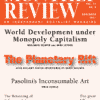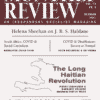
The Eyes of Texas and the Nays
A new poem by Marge Piercy. | more…

November 2021 (Volume 73, Number 6)
There is an urgent need to transcend the deep chasm in historical materialism, extending back to the 1920s, between the Western Marxist philosophical tradition and the Marxism of the Second and Third Internationals. This division has been closely associated with so-called Western MarxismÕs rejection of the dialectics of nature. | more…

The Planetary Rift
The widespread view on the left that Marx had adopted an extreme productivist view of the human domination of nature—and hence had failed to perceive the natural limits to production and ecological contradictions in general, giving them at most only marginal attention—was contradicted by his theory of the metabolic rift. | more…

World Development under Monopoly Capitalism
As the internationalization of monopoly capital grows, particularly through the domination of global value chains, the worldwide rate of exploitation and degree of monopoly increase as well. | more…

The Present in History, 2021
The job of socialists is to engage with public policy from a class perspective, informed by a Marxist understanding of contemporary capitalism—not to reform it, but to abolish it. | more…

Disney, Salò, and Pasolini’s Inconsumable Art
The increasing consolidation of the modern entertainment industry by a small clique of multinational streaming giants is the next step in the “standardization of style” in mass-consumed art. The work of Pier Paolo Pasolini can help remind us of what we’re missing. | more…

Keeping the Challenges Before Us
The reissuing of Reluctant Reformers can inform our attempts to grapple with how the unity of the oppressed can be forged in such a way that the interests of the historically marginalized do not continue to get…well, marginalized. | more…

The great indifference
A new poem by Marge Piercy. | more…

October 2021 (Volume 73, Number 5)
What was most significant about the published Part I of the report was that it revealed that even in the most optimistic projection of the Shared Socioeconomic Pathways—in which carbon emissions globally peak in the next four years, a 1.5°C increase in global average temperature over preindustrial levels would be avoided until 2040, and the goal of net zero carbon emissions would be reached by 2050—the consequences for global humanity would nonetheless be catastrophic by the measure of all historical precedents. | more…

The Long Haitian Revolution
The current situation in Haiti has roots in the historical struggle of the Haitian people, and is part of the endless retribution from imperial powers for its revolution. | more…

Bhima Koregaon and the “Powers of the Other Shore”
In India, today, we are witness to the quiet rise of the figure of Mahar Sidnak, iconized and lionized as a warrior of the oppressed from the early nineteenth century. This is electrifying the anticaste struggle and energizing the militant youth, a source of inspiration as historical as it is mythical. Are material issues, or “real struggle,” really so opposed to the question of the “mythical past”? | more…

COVID, Disablement, and the “Return to Normal”
For many disabled people, the “abnormal” state of things over the last year and a half is not such an estranged discontinuity from the previous state of things. Certainly, just like everyone, pandemic life for disabled people has been exceedingly difficult, painful, oppressive, and deadly. But the “normal” of pre-pandemic life was also exceedingly difficult, painful, oppressive, and deadly. | more…

The South African Pandemic of Racial Capitalism
South Africa’s COVID-19 pandemic is one of racial capitalism, entangled with histories of imperial state formation, settler colonialism, and a hierarchical, global-neoliberal public policy architecture. | more…